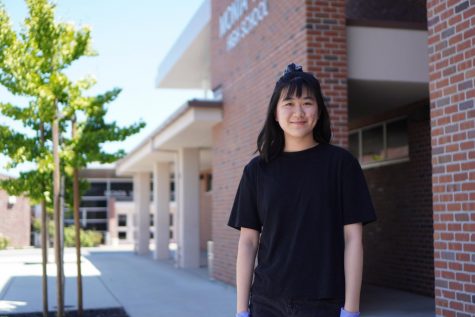Kickin’ It With Kid Kuza: Senior Brian Lee describes his rapping career
Senior Brian Lee describes the initial spark of rapping and the journey into the hobby
November 21, 2018
t’s been a while — a few hours in actuality — and the ear-splitting raps have not ceased. A multitude of people crowd around a booming speaker in
Union Square Park, N.Y., otherwise known as the notorious “cypher” rap circles that gather weekly. The crowd thunders and the park reverberates as a rapper spits his verses. The crowd is accepting. The crowd is cutthroat. Senior Brian Lee, shrouded in fear, stepped up to rap after hours of idly loitering among the crowd, anticipating his grab at the spotlight. His nerves gradually wained as he rapped energetically, electrifying the audience.
Lee, otherwise known by his stage name “Kid Kuza,” initiated his rapping career at the end of his sophomore year. Though questioned countlessly for the derivation of his stage name, Lee has
no anecdote or descriptive story behind the name. He just likes the sound of the letter ‘K’.
At the beginning, Lee didn’t consider rapping seriously and freestyled with his friends. Fast forward to a year later and Lee now regularly engages in music production.
“At the beginning, [rapping] was more self-driven because it’s just this new art form and I wanted to take part of,” Lee said. “I just wanted to get better. Eventually when I started listening to more hip hop music, I started to take inspiration from actual rappers and producers.”
As one of the first supporters of Lee’s profession, senior Thomas Baker, a student of Bellarmine College Preparatory addresses that New York was a prime “turning point” for Lee’s career that wasn’t “set in stone.”
“New York, what it did for him is that he came to realize that what he’s doing is actually amazing. So when he came back, he took that same energy. He had from New York that same confidence that he had and he brought it back. He’s like, ‘this is what I want to do. I’m going to redefine myself.’”
One of the first famed rappers Lee drew inspiration from was an American rapper known as “Logic.”
As Lee progressively started to appreciate “older” hip hop cultures and produce his own music, he began to register the artistic facet of rapping.
“How I see rapping is that it’s poetry combined with music, which makes it special because it’s a very raw type of expressing yourself,” Lee said. “It’s a raw art form because the culture of hip hop is to be rebellious. The kind of rebelliousness is still there, but it’s also like more freedom. I see it as a art form where I can express myself through music, through playing instruments or making beats. I can put emotion into that.”
According to Lee, his number one “rule” is to be honest and rap with utmost sincerity; he doesn’t write lyrics with references to abstract themes he doesn’t believe in. Lee writes whatever he feels strongly about.
Lee also doesn’t conform to one distinctive rapping style, constantly broadening his expertise. He likes to present differing “flows” and approaches, as well as “show off” his prowess through versatility.
A part of this versatility is his incorporation of comedic wordplay in his rap lyrics.
“If we’re talking about rap or just writing, I like to rap clever lines,” Lee said. “I use a lot of metaphors, double entendres. For me, that’s just kind of the fun part I guess. Saying something that can mean a totally [different] thing if you look at it from a different perspective.”
Additionally, Lee was also attracted to film production and reckoned he ought to combine two of his passions into one by creating music videos.
With the assistance of senior Chetan Mokkapati and Baker, the three planned every shot; every scene onset is “prepared and planned.” Additionally, Mokkapati and Baker’s endless support and “creative influence” in the making of Lee’s music video alongside with other numerous projects fueled Lee’s progression.
“I’ve been his friend since 8th grade and I’ve seen him grow to be in this stage in his life to see how much he’d have to overcome,” Mokkapati said. “It makes me very proud to see the attention and how much support he’s getting now because of how much hard work he’s put in.”
On Sept. 26, 2018, Lee released his music video “K.O.,” with Mokkapati and Baker’s support, under the name of “Kid Kuza.” With an accumulation of more than 1,500 views, the film illustrates Lee in scenes of contrasting locations: alleyways, deserts and public centers.
“I felt [definitely relieved.] I set deadlines for myself and pressured myself into doing which is a good thing,” Lee said. “I felt [just excited]; I put in a lot of work and I learned a lot in a month before I finished it. I was excited to show people.”
Presently, Lee is applying to college as a film major; college offers Lee a multitude of musical opportunities. Lee considers the possibiliof a rapping profession in the near future.
“Ideally, I just keep working on music so I’m performing more – try to get more connections,” Lee said. “Eventually I’ll get to a point where I’ll have a solid body of work and I’ll be able to present that to people: this is what I represent. That way it’ll be easier for people to share that. And that’ll help me grow as a musician.”




























